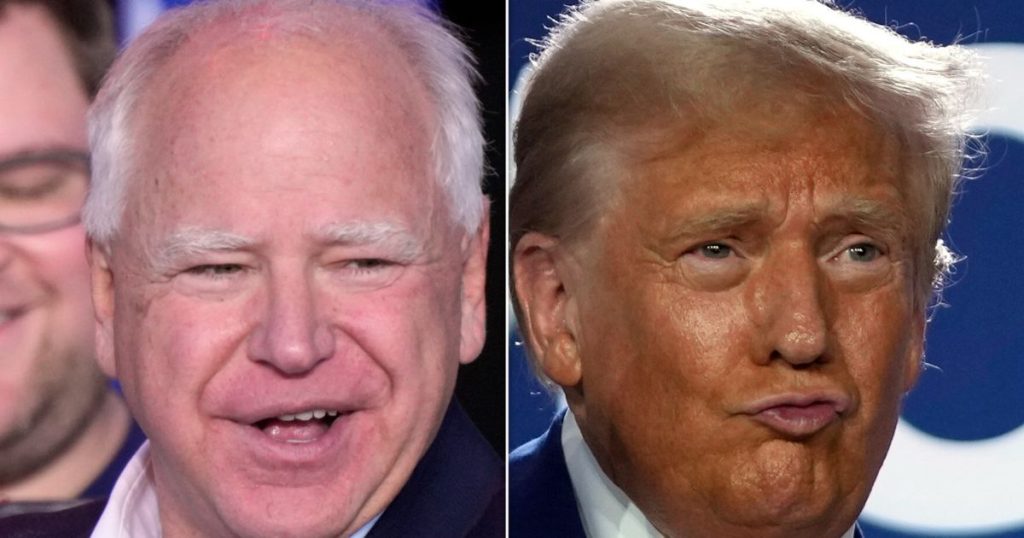Minnesota Gov. Tim Walz, the Democratic candidate for vice president, used Labor Day to highlight the stark contrast between how Donald Trump views common workers and his wealthy friends. During a speech in Milwaukee, Walz criticized Trump for giving tax cuts to the rich while telling workers they are paid too much. Trump’s administration also opposed a minimum wage hike in 2019, but Walz noted that the president said he would “consider it to an extent” if reelected in 2020. Walz emphasized that workers are not asking for tax cuts for billionaires or cuts to their healthcare, education, or job security. Instead, they simply want to be treated fairly and with dignity.
Walz’s comments reflect the broader Democratic argument against the Trump administration’s policies, which they see as favoring the wealthy and neglecting the needs of working-class Americans. By framing the issue in terms of fairness and dignity, Walz seeks to appeal to voters who may feel disenfranchised or overlooked by the current administration. He emphasized the disconnect between Trump’s actions benefiting the wealthy elite and the struggles faced by everyday workers trying to make ends meet and support their families. This messaging aligns with the Democratic Party’s platform of advocating for policies that support the middle class and address income inequality.
The mention of Mar-a-Lago, Trump’s private club in Florida, served as a symbol of the president’s wealth and privilege, contrasting with the experiences of average Americans. Trump’s statement to wealthy individuals at Mar-a-Lago about giving them tax cuts while lamenting that workers are paid too much further highlighted his administration’s priorities. Walz positioned himself as a champion of workers’ rights and a defender against policies that disproportionately benefit the wealthy at the expense of the working class. By drawing attention to Trump’s remarks and policies, Walz sought to underscore the importance of the upcoming election in shaping the direction of the country’s economic policies and protections for workers.
The Democratic Party’s focus on workers’ rights and economic justice has been a consistent theme throughout the 2020 election campaign. Walz’s Labor Day speech served as a reminder of the party’s commitment to fighting for policies that support working families and address economic disparities. By highlighting Trump’s record on issues such as tax cuts for the wealthy and opposition to a minimum wage hike, Walz aimed to underscore the contrast between Democratic and Republican approaches to economic policy. The choice of framing the discussion in terms of dignity and fairness resonates with voters who feel that their concerns have been sidelined or ignored by the current administration.
As the Democratic candidate for vice president, Walz’s speech also carried broader implications for the party’s electoral strategy. By emphasizing the need for policies that prioritize working-class Americans and promote economic equality, he sought to rally support among key voter demographics. The Midwest, including states like Wisconsin where Walz delivered his speech, has been a crucial battleground region in recent elections. By focusing on issues such as fair wages, healthcare access, and job security, Walz aimed to connect with voters in these swing states and persuade them to support the Democratic ticket in November.
In conclusion, Minnesota Gov. Tim Walz used Labor Day as an opportunity to highlight the sharp divergence between President Trump’s treatment of the wealthy and everyday workers. By critiquing Trump’s policies on tax cuts, minimum wage, and healthcare, Walz sought to underscore the need for a more equitable and dignified approach to economic policy. With an eye toward the upcoming election, Walz’s speech underscored the Democratic Party’s commitment to workers’ rights and economic justice, positioning him as a champion of working-class interests. The contrast between Trump’s focus on the wealthy elite and Walz’s advocacy for fairness and dignity resonates with voters looking for a candidate who prioritizes their needs and concerns.








